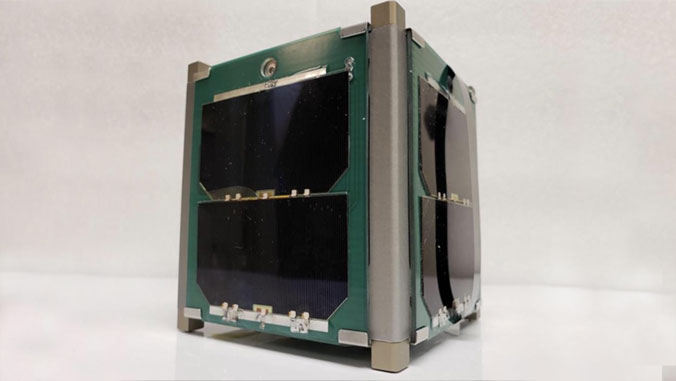
More than 100 people contributed to the creation of “Hiapo,” a small satellite equipped with sensors to measure Earth’s magnetic field. Participants included students from Hawaiʻi Island schools and the University of Hawaiʻi and faculty from the Hawaiʻi Science and Technology Museum (HSTM) and UH.
After two years of work, the miniature CubeSat satellite, measuring just 4 inches on each side, was ready for launch. On September 2, Hiapo was aboard the maiden launch of the Firefly Aerospace’s Alpha Launch Vehicle which took off from Vandenberg Airforce Base in California.
Unfortunately, about 2 minutes into the launch, after hitting supersonic speed, the rocket experienced an anomaly and the engine failed.
“Although Hiapo didn’t make it into orbit, this one project inspired a movement here at UH to widen the pool of entry for students who want to join the field of aerospace engineering,” said Amber Imai-Hong, an avionics engineer with the Hawaiʻi Space Flight Laboratory at UH Mānoa’s School of Ocean and Earth Science and Technology.
Providing real-world experiences
“Our team took this project from concept to launch and we learned so much along the way,” said Christian Wong, director of HSTM, a Hilo-based science education non-profit. “Developing a science mission, designing the spacecraft, testing and delivery, and meeting the required specifications—it’s a pretty complex process. We certainly could not have done it without the guidance of our partners at the Hawaiʻi Space Flight Laboratory at UH Mānoa.”
Through the HSTM, Wong runs various rocketry and robotics programs for students in elementary through high school. Wong had an idea to provide a real-world experience for the students. He asked Imai-Hong if they could develop a satellite on a shoestring budget.
“It was very reminiscent of the early days of robotics in Hawaiʻi,” said Imai-Hong. “We gathered up all sorts of old parts from the Hawaiʻi Space Flight Lab and made a design plan. It was an exciting challenge.”
Imai-Hong and Heather Bottom, an aerospace engineer from NASA JPL (Jet Propulsion Lab), provided training in design and project management as well as hands-on skills such as soldering and circuit assembly in a “clean room” provided by the UH Institute for Astronomy. Additionally, the Hiapo team of students in grades 3–12 and undergraduates, staff and faculty assembled components and tested instrumentation.
“Most students had less than a year of experience with satellite design or rocketry when they started working on Hiapo,” said Imai-Hong. “This project gave many interested and enthusiastic students the knowledge and confidence to become leaders in their groups.”
“I consider this a huge accomplishment for Firefly and all members of the Hiapo team,” added Wong. “We got a lot out of the experience. This is a once in a lifetime opportunity for our organization, the students who were a part of this and the community in Hawaiʻi. CubeSats can be an industry here in Hawaiʻi.”
This collaboration is an example of UH Mānoa’s goal of Excellence in Research: Advancing the Research and Creative Work Enterprise (PDF) and Enhancing Student Success (PDF), two of four goals identified in the 2015–25 Strategic Plan (PDF), updated in December 2020.
For more information, see SOEST’s website.
–By Marcie Grabowski

